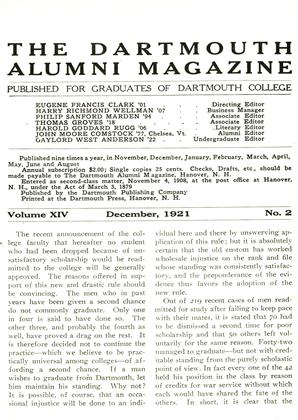Whiting Williams, author of "What's on the Worker's Mind" and "Full Up and Fed Up," has been appointed as Staff Lecturer in the Tuck School. Beginning Feb. 13, Mr. Williams will give a four weeks' course, open to second-year men in the Tuck School. The course is designed to bring about a clear understanding of the psychological forces affecting human relations in commerce and industry, and to define the principles which must underlie all hopeful projects for arriving at industrial peace. The experiences of the lecturer will be drawn upon for a series of concrete cases which will serve as the principal subjects of discussion. Last spring Mr. Williams gave one of the most interesting lectures in a series arranged by Professor Keir for the course on Labor Problems.
Several years ago, as Vice-President of the Hydraulic Pressed Steel Company, Mr. Williams became convinced that intelligent treatment of the labor problem must rest on firsthand knowledge of the facts and influences contributing to the laborer's state of mind. He then conceived the unusual plan of dropping the role of employer and of working as a laborer among laborers at the points of greatest unrest. His first venture was to spend several months as a worker in the coal mines and steel mills of this country. In magazine articles and in the book, "What Is on the Worker's Mind," the public has been given an illuminating account of his experiences and conclusions.
In the summer of 1920, he employed similar means of acquainting himself with the labor problems of mines, steel mills, shipyards, and docks of England, Scotland, and Wales. These adventures Mr. Williams has recently published in a fascinating book called "Full Up and Fed Up." During the past summer, he worked as a miner in France and Germany and, in addition to visiting the deep mines of Belgium, revisited mining towns in England. With these experiences, supplemented by interviews with Premier Briand of France and officers of the Krupp organization in Germany, he brings home a remarkable insight into labor conditions abroad.
 View Full Issue
View Full Issue
More From This Issue
-
 Article
ArticleALUMNI COUNCIL MEETS
December 1921 By EUGENE F. CLARK -
 Article
ArticleTHE BURYING GROUND
December 1921 By EDWIN JULIUS BARTLETT '72 -
 Article
ArticleTHE FRESHMAN CLASS
December 1921 By E. GOKDON BILL -
 Article
ArticleThe recent announcement of the college faculty that hereafter no student
December 1921 -
 Article
ArticleNEW FACULTY REGULATIONS
December 1921 -
 Sports
SportsFOOTBALL
December 1921







